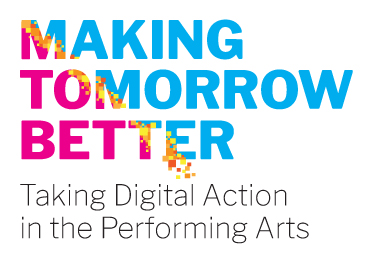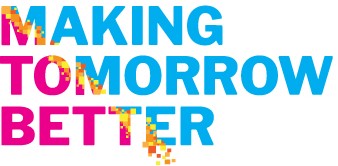Initiative Objectives
Making Tomorrow Better: Taking Digital Action in the Performing Arts is a national digital literacy initiative that brings practical digital know-how to participants so they:
- assess their actual digital footprint, intended and unintended
- examine how online platforms like Google, Facebook and the like see their web content and as a result learn to improve their overall web presence
- understand how to decide where to invest time and money in their digital presence and measure effectiveness
- learn how to use digital tools to best effect, including semantic web / structured data, linked data and the like
- become digital adapters and innovators
Is this initiative for me?
Participants will include individual artists, and a wide range of arts and cultural workers.
You can be active in the performing arts (e.g. music, theatre, dance, spoken word/storytelling), or work in visual arts and other artistic and cultural pursuits. We expect many will work at arts venues as decision-makers (managing directors), approvers (marketing managers) or users (box office, artistic programming, donor relations). These workshops will equip you to ask for the right things and ensure you or your organization upgrades to and maintains a powerful, contemporary web presence.
These workshops are designed to help participants speak digital with confidence – that is, we will demystify and discuss the digital realm in plain English – and quickly become competent participants in arts sector conversations about leading digital tools, emerging digital innovations, and new digital business models.
The Project Partners
- Atlantic Presenters Association (chair)
- BC Touring Council
- Manitoba Arts Network
- N3 / Yukon Arts Centre
- Northern Arts and Cultural Centre (NWT)
- Island Mountain Arts / Northern Exposure (BC)
Any arts organization in Canada can request workshops for their community. Contact Inga Petri, our project manager, to discuss the options.
Of note: we tailor content to suit the unique challenges, including slower internet connectivity, in rural and remote communities across Canada.
APA is the regional arts service organization for arts presenters in Newfoundland and Labrador, Prince Edward Island, Nova Scotia and New Brunswick. We are the market place for performing artists and presenters to meet and do business and we provide vital services and programs to support the work of our members in their local communities.
Together with our members, we aspire to be at the vanguard of enriching the lives of Atlantic Canadians and building vibrant, inclusive communities through shared live performance experiences. We embrace the opportunities of the digital realm and we work to resolve the challenges it presents.

Workshop Leader
Inga Petri, Strategic Moves, has been putting digital conversations in the performing arts sector on the agenda since 2011, when she lead the seminal Value of Presenting: A Study of Performing Arts Presentation in Canada (© 2013, CAPACOA). She has a long record of collaboration with our sector including co-writing Digitizing the Performing Arts: An Assessment of Issues, Opportunities and Challenges (© 2017, CAPACOA). Inga crosses the arts and technology divide easily: since 1997, she has managed the development of web site applications, conceived online marketing campaigns, and helped organizations forge closer connections with their audiences in the digital and physical realms.

Workshop Leader
Tammy Lee is a career arts manager turned entrepreneur dedicated to taking on ambitious projects that help the arts thrive. She is co-founder and CEO of Culture Creates. Culture Creates makes information on what’s happening in the performing arts compatible with an AI-powered world – making this information easier to find, share, collect and disseminate. Their goal is to work with cultural organizations to build the world’s most trusted data source on what’s happening in the arts. Tammy and her co-founder Gregory Saumier-Finch seek to position the arts sector as a world leader in leveraging linked open data and in adopting a collective data governance model.






